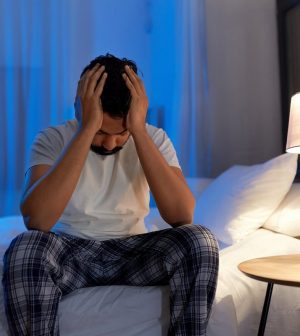- Could Your Grocery Store Meat Be Causing Recurring UTIs?
- Are You Making This Expensive Thermostat Error This Winter?
- Recognizing the Signs of Hypothyroidism
- 10 Strategies to Overcome Insomnia
- Could Artificial Sweeteners Be Aging the Brain Faster?
- Techniques for Soothing Your Nervous System
- Does the Water in Your House Smell Funny? Here’s Why
- Can a Daily Dose of Apple Cider Vinegar Actually Aid Weight Loss?
- 6 Health Beverages That Can Actually Spike Your Blood Sugar
- Treatment Options for Social Anxiety Disorder
Suicidal Impulses May Peak During Restless Nights

The wee hours of the morning could be the most dangerous for someone on the brink of suicide or homicide, a new study shows.
There’s a five-fold greater risk for suicide and an eight-fold greater risk for homicide between 2 a.m. and 3 a.m. for those awake in the still of the night, researchers report.
“Disrupted sleep may acutely impair rational thought, which can drive impulsive behaviors in vulnerable individuals,” said lead study author Andrew Tubbs, a researcher in the University of Arizona’s Sleep and Health Research Program.
Statistics show that nearly 19% of suicides and 36% of homicides take place at night, researchers said in background notes.
For the new study, they analyzed 15 years of U.S. data involving more than 78,000 suicides and 50,000 homicides.
Teens and young adults were three times more likely to commit suicide in the still of the night, researchers reported May 29 in the Journal of Clinical Psychiatry.
Nighttime risk of suicide is also higher for people who’ve been drinking and those who’ve been fighting with their partner.
However, being awake late did not seem to increase suicide risk among people with a history of suicidal thoughts or prior attempts, results show.
The risk for homicide did not vary by age, but young adults accounted for more than half of all homicide victims at night.
Waking in the night appears to interfere with the brain’s complex decision-making functions, researchers said. It reduces rational thinking at a time when a person’s negative mood is at its peak and their positivity is at its lowest.
“Few studies have examined time-of-day trends in violent crime,” Tubbs said in a university news release. “Future studies could clarify what exactly is happening in the brain to predispose people to these sorts of risks and whether evidence-based strategies to improve sleep and reduce nighttime wakefulness can help reduce the risks and prevent these tragic outcomes.”
If you or a loved one is struggling with suicidal thoughts and feelings, the 988 Suicide & Crisis Lifeline can help.
More information
The Sleep Foundation has more about mental health and sleep.
SOURCE: University of Arizona, news release, May 29, 2024
Source: HealthDay
Copyright © 2026 HealthDay. All rights reserved.










